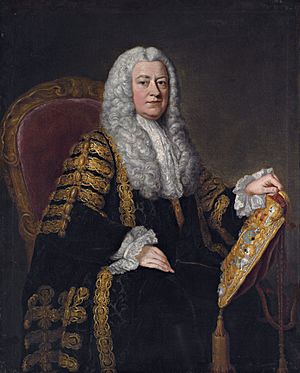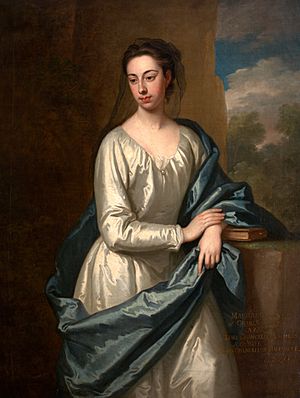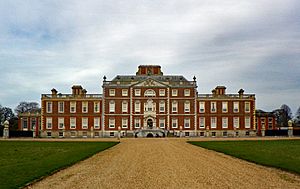Philip Yorke, 1st Earl of Hardwicke facts for kids
Quick facts for kids
The Earl of Hardwicke
|
|
|---|---|

Portrait by William Hoare
|
|
| Lord High Chancellor of Great Britain Lord High Steward for the trials of: |
|
| In office 21 February 1737 – 19 November 1756 |
|
| Monarch | George II |
| Prime Minister | Sir Robert Walpole The Earl of Wilmington Henry Pelham The Duke of Newcastle |
| Preceded by | The Lord Talbot |
| 12th Chancellor of the College of William & Mary | |
| In office 1764–1764 |
|
| Personal details | |
| Born | c. 1 December 1690 Dover, Kent, England |
| Died | 6 March 1764 (aged 73) London, England |
| Spouses | Margaret, Lady Yorke |
| Children | 7 |
| Education | Middle Temple |
| Profession | Lawyer |
Philip Yorke, 1st Earl of Hardwicke (born December 1, 1690 – died March 6, 1764) was an important English lawyer and politician. He held the very high position of Lord High Chancellor of Great Britain. He was also a close friend and advisor to the Duke of Newcastle, who was Prime Minister for several years.
Contents
Early Life and Family
Philip Yorke was born in Dover, England. His father, also named Philip Yorke, was a lawyer. Philip went to a school in Bethnal Green run by Samuel Morland.
When he was 16, Philip started working in a lawyer's office in London. He later studied law at the Middle Temple. In 1715, he became a lawyer. He quickly became very successful, partly because of the help he received from Thomas Parker, 1st Earl of Macclesfield, who later became Lord Chancellor.
In 1719, Philip Yorke became a member of Parliament for Lewes. The next year, he was made Solicitor General and received a knighthood, becoming Sir Philip Yorke. This was very fast for someone who had only been a lawyer for four years!
On May 16, 1719, he married Margaret Cocks. They had five sons and two daughters:
- Philip Yorke, Viscount Royston (1720–1790), who became the next Earl of Hardwicke.
- Hon. Charles Yorke (1722–1770), who also became Lord Chancellor, just like his father.
- Lady Elizabeth Yorke (1725–1760), who married Lord Anson.
- Hon. Joseph Yorke (died 1792), who became a diplomat.
- Hon. John Yorke (1728–1801), who was a Member of Parliament.
- Hon. James Yorke (1730–1808), who became a bishop.
- Lady Margaret Yorke, who married Sir Gilbert Heathcote.
In 1739, he bought Wimpole Hall, a large country house in Cambridgeshire. He is buried there with many of his family members.
Legal and Political Career
Philip Yorke had a very important career in law and politics.
Attorney-General
In 1723, he became the Attorney General, a top legal advisor to the government. He helped pass a bill against Francis Atterbury, who was accused of a serious crime against the country.
In 1729, Philip Yorke and another lawyer, Charles Talbot, gave a legal opinion that said slavery was legal. This opinion was used by many people at the time.
He also helped the government of Prime Minister Robert Walpole by supporting laws about loans to other countries and increasing the army.
Lord Chief Justice and Lord Chancellor
In 1733, Philip Yorke became the Lord Chief Justice of the King's Bench, a very important judge. He was also given the title Lord Hardwicke.
In 1737, he became the Lord High Chancellor of Great Britain. This made him a member of the Prime Minister's cabinet. He held this position for a very long time, longer than almost anyone else.
Influence in Government
As Lord Chancellor, Lord Hardwicke became very important in the House of Lords. He often had to explain and defend the government's plans.
When the King was away from England, Lord Hardwicke was often in charge of the council that ran the country. He helped manage the response to the Jacobite uprising in 1745. After the Battle of Culloden, he oversaw the trials of the Scottish rebels.
He also helped make important laws:
- In 1746, he helped remove old feudal powers in Scotland, which meant powerful landowners lost some of their old authority.
- In 1751, he supported a reform of the calendar.
- In 1753, he successfully passed the Marriage Act. This law made marriage rules clearer and became the basis for later laws about marriage.
Later Years
When Prime Minister Henry Pelham died in 1754, Lord Hardwicke helped Newcastle become the new Prime Minister. For this, he was made the Earl of Hardwicke.
He retired from his position as Lord Chancellor in 1756. However, he still played a role in politics. He helped bring together two important politicians, Newcastle and William Pitt, to form a new government in 1757.
After King George III came to the throne, Lord Hardwicke disagreed with some of the new government's policies, like the peace treaty with France in 1762. He also spoke out against "general warrants" (search warrants that were too broad) in the famous Wilkes case.
Lord Hardwicke died in London on March 6, 1764.
Legacy
Lord Hardwicke was known for his fair and careful judgments. His decisions helped shape how Equity (a type of law based on fairness) works in England. He also helped change how judges behaved, making them more impartial and professional.
Images for kids
 | Charles R. Drew |
 | Benjamin Banneker |
 | Jane C. Wright |
 | Roger Arliner Young |





